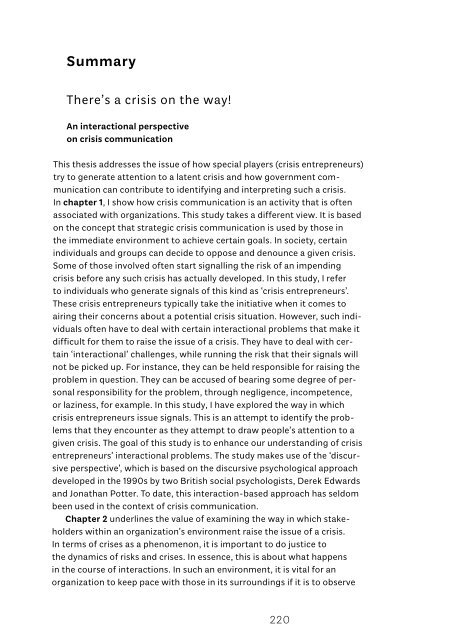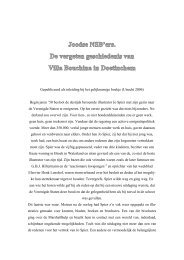Proefschrift Crisis in aantocht! - Onderzoek - Hogeschool Utrecht
Proefschrift Crisis in aantocht! - Onderzoek - Hogeschool Utrecht
Proefschrift Crisis in aantocht! - Onderzoek - Hogeschool Utrecht
You also want an ePaper? Increase the reach of your titles
YUMPU automatically turns print PDFs into web optimized ePapers that Google loves.
Summary<br />
There’s a crisis on the way!<br />
An <strong>in</strong>teractional perspective<br />
on crisis communication<br />
This thesis addresses the issue of how special players (crisis entrepreneurs)<br />
try to generate attention to a latent crisis and how government communication<br />
can contribute to identify<strong>in</strong>g and <strong>in</strong>terpret<strong>in</strong>g such a crisis.<br />
In chapter 1, I show how crisis communication is an activity that is often<br />
associated with organizations. This study takes a different view. It is based<br />
on the concept that strategic crisis communication is used by those <strong>in</strong><br />
the immediate environment to achieve certa<strong>in</strong> goals. In society, certa<strong>in</strong><br />
<strong>in</strong>dividuals and groups can decide to oppose and denounce a given crisis.<br />
Some of those <strong>in</strong>volved often start signall<strong>in</strong>g the risk of an impend<strong>in</strong>g<br />
crisis before any such crisis has actually developed. In this study, I refer<br />
to <strong>in</strong>dividuals who generate signals of this k<strong>in</strong>d as ‘crisis entrepreneurs’.<br />
These crisis entrepreneurs typically take the <strong>in</strong>itiative when it comes to<br />
air<strong>in</strong>g their concerns about a potential crisis situation. However, such <strong>in</strong>dividuals<br />
often have to deal with certa<strong>in</strong> <strong>in</strong>teractional problems that make it<br />
difficult for them to raise the issue of a crisis. They have to deal with certa<strong>in</strong><br />
‘<strong>in</strong>teractional’ challenges, while runn<strong>in</strong>g the risk that their signals will<br />
not be picked up. For <strong>in</strong>stance, they can be held responsible for rais<strong>in</strong>g the<br />
problem <strong>in</strong> question. They can be accused of bear<strong>in</strong>g some degree of personal<br />
responsibility for the problem, through negligence, <strong>in</strong>competence,<br />
or laz<strong>in</strong>ess, for example. In this study, I have explored the way <strong>in</strong> which<br />
crisis entrepreneurs issue signals. This is an attempt to identify the problems<br />
that they encounter as they attempt to draw people’s attention to a<br />
given crisis. The goal of this study is to enhance our understand<strong>in</strong>g of crisis<br />
entrepreneurs’ <strong>in</strong>teractional problems. The study makes use of the ‘discursive<br />
perspective’, which is based on the discursive psychological approach<br />
developed <strong>in</strong> the 1990s by two British social psychologists, Derek Edwards<br />
and Jonathan Potter. To date, this <strong>in</strong>teraction-based approach has seldom<br />
been used <strong>in</strong> the context of crisis communication.<br />
Chapter 2 underl<strong>in</strong>es the value of exam<strong>in</strong><strong>in</strong>g the way <strong>in</strong> which stakeholders<br />
with<strong>in</strong> an organization’s environment raise the issue of a crisis.<br />
In terms of crises as a phenomenon, it is important to do justice to<br />
the dynamics of risks and crises. In essence, this is about what happens<br />
<strong>in</strong> the course of <strong>in</strong>teractions. In such an environment, it is vital for an<br />
organization to keep pace with those <strong>in</strong> its surround<strong>in</strong>gs if it is to observe<br />
220







